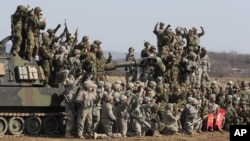SEOUL - South Korea is participating in several military exercises, some overlapping and involving other countries including the United States and Japan.
U.S. and Japanese naval forces have joined their counterparts from South Korea for a two-day exercise in international waters south of Jeju island.
North Korea's ruling party newspaper Rodong Sinmun says the three-nation drill threatens to bring a “new cloud of war” to Northeast Asia.
The U.S. and South Korean navies are to continue with what is described as a “routine carrier operation" in the Yellow Sea, west of the Korean peninsula, Saturday through Monday. The USS George Washington carrier striker group is joining both exercises.
On land, South Korean and American soldiers are to conduct one of their biggest ever joint single-day drills Friday.
It will involve 2,000 troops, fighter jets and other aircraft, including attack helicopters, as well as tanks and rocket launchers firing thousands of rounds.
It is to take place at Pocheon, about 60 kilometers south of the demilitarized zone.
North Korea has lashed out, with typical rhetoric, characterizing this as "clamor for the invasion of the North that makes the situation worse."
South Korea's defense ministry responded to the charge.
Ministry spokesman Kim Min-seok tells reporters, although North Korea claims it as a provocation, no military can improve its capabilities without conducting training. He says it is akin to test-takers practicing with various questions. Kim calls North Korea's provocation assertion "totally illogical."
Senior researcher Baek Seung-joo at the Korea Institute for Defense Analyses says North Korea is issuing criticism for internal consumption.
Baek says, rather than actually feeling threatened, Pyongyang realizes the exercises in the South are for defensive purposes, but issues criticism to promote solidarity among North Korean citizens by emphasizing a sense of crisis.
Additionally, early next month, South Korea will participate in a Japan-based interdiction exercise which will include Australian and Singaporean airmen.
Officials say the drill, based at Chitose Air Base, in Hokkaido, will simulate a plane carrying radioactive substances flying into Japanese air space. The four air forces are to work together to carry out a mock forced landing of the aircraft and to inspect its cargo.
The exercise is part of the U.S.-led Proliferation Security Initiative, intended to halt trafficking of weapons of mass destruction.
Analyst Baek at the Korea Institute for Defense Analyses says these exercises have been in the works for a long time and come in response to increased provocations by the North, beginning in 2010.
Baek says the drills send a message that both South Korea and the United States are strongly determined to jointly respond to further North Korean provocations and demonstrate what Pyongyang could face.
Some analysts note one reason for the various drills now is that June has been traditionally a month when North Korea carries out military provocations. They also note the recent warnings emanating from Pyongyang about a "special action" against Seoul and specific warnings to attack the headquarters of particular conservative newspapers and broadcasters deemed to have offended North Korea with critical coverage.
U.S. and Japanese naval forces have joined their counterparts from South Korea for a two-day exercise in international waters south of Jeju island.
North Korea's ruling party newspaper Rodong Sinmun says the three-nation drill threatens to bring a “new cloud of war” to Northeast Asia.
The U.S. and South Korean navies are to continue with what is described as a “routine carrier operation" in the Yellow Sea, west of the Korean peninsula, Saturday through Monday. The USS George Washington carrier striker group is joining both exercises.
On land, South Korean and American soldiers are to conduct one of their biggest ever joint single-day drills Friday.
It will involve 2,000 troops, fighter jets and other aircraft, including attack helicopters, as well as tanks and rocket launchers firing thousands of rounds.
It is to take place at Pocheon, about 60 kilometers south of the demilitarized zone.
North Korea has lashed out, with typical rhetoric, characterizing this as "clamor for the invasion of the North that makes the situation worse."
South Korea's defense ministry responded to the charge.
Ministry spokesman Kim Min-seok tells reporters, although North Korea claims it as a provocation, no military can improve its capabilities without conducting training. He says it is akin to test-takers practicing with various questions. Kim calls North Korea's provocation assertion "totally illogical."
Senior researcher Baek Seung-joo at the Korea Institute for Defense Analyses says North Korea is issuing criticism for internal consumption.
Baek says, rather than actually feeling threatened, Pyongyang realizes the exercises in the South are for defensive purposes, but issues criticism to promote solidarity among North Korean citizens by emphasizing a sense of crisis.
Additionally, early next month, South Korea will participate in a Japan-based interdiction exercise which will include Australian and Singaporean airmen.
Officials say the drill, based at Chitose Air Base, in Hokkaido, will simulate a plane carrying radioactive substances flying into Japanese air space. The four air forces are to work together to carry out a mock forced landing of the aircraft and to inspect its cargo.
The exercise is part of the U.S.-led Proliferation Security Initiative, intended to halt trafficking of weapons of mass destruction.
Analyst Baek at the Korea Institute for Defense Analyses says these exercises have been in the works for a long time and come in response to increased provocations by the North, beginning in 2010.
Baek says the drills send a message that both South Korea and the United States are strongly determined to jointly respond to further North Korean provocations and demonstrate what Pyongyang could face.
Some analysts note one reason for the various drills now is that June has been traditionally a month when North Korea carries out military provocations. They also note the recent warnings emanating from Pyongyang about a "special action" against Seoul and specific warnings to attack the headquarters of particular conservative newspapers and broadcasters deemed to have offended North Korea with critical coverage.










